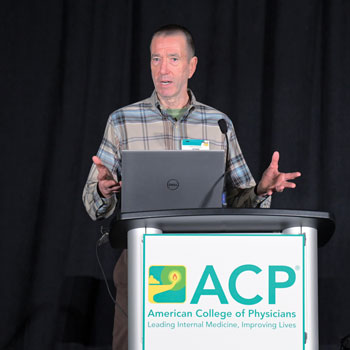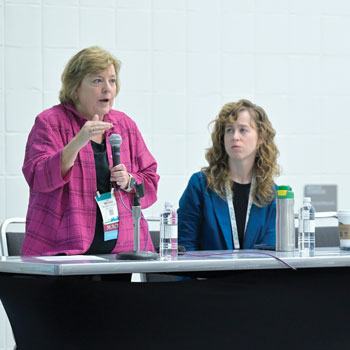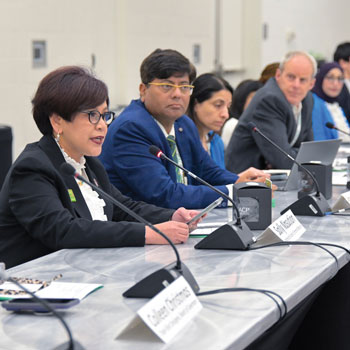‘LEGO’ of the idea you can't be ‘the Special’
A total of 470 ACP members gathered in Washington, D.C., for Leadership Day to learn about key health policy issues and then go to Capitol Hill to talk about them with their lawmakers.
I have recently become a little obsessed with LEGO® bricks. I blame my young adult kids, who have also regained interest in the toys and have put together some elaborate structures like F1 race cars, Star Wars spaceships, guitars, cameras, and more. I love flowers, so I started out simple by putting together a few of those sets, then got inspired when I saw the “Everyone Is Awesome” set and had to build it as well.
“Everything Is Awesome” is the theme of the series of LEGO® movies that have come out over the past several years—and much of the messaging in those movies was meaningful, even while being more than a little silly. For example, a key plot point involved an everyday laborer, Emmet Brickowski, who becomes “the Special” after finding the “Piece of Resistance.”
I told you the movies were silly, but given all the unpredictability of our world these days—and since we were heading into ACP's premier advocacy event, Leadership Day—I decided to look to the LEGO® world for a little inspiration to help us out.
A total of 470 ACP members gathered in Washington, D.C., on April 28-29 to learn about key health policy issues and then go to Capitol Hill to talk about them with their lawmakers. The attendees hailed from all 50 states and the District of Columbia and included 67 medical students and 132 residents who conducted 414 congressional meetings.
The issues attendees were asked to discuss are all challenging and complex (more on these momentarily), so it felt right to send them off with the following message from Emmet, who said, “You are the most talented, most interesting, and most extraordinary person in the universe. And you are capable of amazing things. Because you are ‘the Special.’ And so am I. And so is everyone. Right now, it's about you, and you … still … can change everything.”
The first issue on the table was the Medicare Physician Fee Schedule (PFS), with ACP members calling on members of Congress and their staff to support and improve access to care for older adults by strengthening our Medicare physician payment system. Unlike that of every other type of “provider” in the program, physician payment in Medicare is not updated to account for inflation. As a result, after adjustment for inflation in practice costs, Medicare payment to practices has dropped 33% since 2001. Additionally, federal law requires that increases in payment to any service within the PFS must be offset by arbitrary across-the-board payment cuts to all services in the PFS. This mandate, known as budget neutrality, has caused annual physician payment cuts since 2021. Therefore, we called on the Leadership Day attendees to ask their members of Congress to cosponsor and pass H.R. 879, the Medicare Patient Access and Practice Stabilization Act.
This bill would not only reverse the 2.83% cut that went into effect on Jan. 1, it would also include a 2% payment update (approximately half of the Medicare Economic Index, an inflationary measure) to provide stabilization for physicians and their practices. It was introduced by Rep. Gregory Murphy, MD, R-NC, and is now cosponsored by 159 representatives—90 Democrats and 69 Republicans. Given the popularity of this bill, it seems like it would not be difficult to get across the finish line. But, as usual, it's all about the money. While the bill has not received an official score from the Congressional Budget Office (CBO), it is expected to cost quite a bit. Our hope is that our Leadership Day ask can lead to even more cosponsors and to passage sometime later this year—ideally outside of the current reconciliation package being considered on the Hill.
The second priority issue for Leadership Day was protecting Medicaid. Medicaid is the country's largest public health insurer, covering about 79 million people, or one in five Americans, and is funded jointly by the states and the federal government. However, if you've been paying attention at all to what has been happening on the Hill, you are likely aware that there are several policy proposals in the 119th Congress that could result in major cuts and structural changes to the Medicaid program.
Policy proposals include, but are not limited to, imposing work requirements, transitioning the program to a block grant or a per capita cap, and lowering the Federal Medical Assistance Percentage (FMAP). Many wonder what is wrong with work requirements—shouldn't the government be encouraging Medicaid recipients to work so that they can then move off the Medicaid rolls? However, the data do not support this approach. In fact, most adults on Medicaid are already working or face barriers to work due to caregiving responsibilities, illness or disability, or school attendance. And according to a CBO analysis, the policy would increase the number of people without health insurance while not actually increasing their employment.
There are other negative impacts of cutting or making significant structural changes to Medicaid that do seem to resonate across both aisles of Congress. If the FMAP were to decrease, whether across the board or in the Medicaid expansion states, then it is up to the states to make up that difference in their budget through tax increases or cuts in other programs. If states are not able to offset the loss of federal Medicaid funds, they will be forced to make cuts to their Medicaid programs by rolling back coverage, reducing health care services, and lowering payment rates. It is important to note that coverage matters. Adults who are covered by Medicaid are 70% more likely to have a regular place of care and 55% more likely to have a regular doctor than uninsured adults, as well as 25% more likely to report being in good to excellent health.
Finally, the Leadership Day attendees addressed the critical issue of protecting and investing in public health infrastructure, including maintaining vaccinations. Recent actions by the Trump Administration have weakened efforts to make Americans healthier and diminished our ability to implement evidence-based public health strategies. One example is the cancellation of previously awarded grants to state health departments to track the occurrence of infectious diseases (including measles). Additionally, medical and health services research grants and funding opportunities that would improve our understanding of how to prevent and treat disease have been terminated. Further, five regional Department of Health and Human Services (HHS) offices are being closed and up to 20,000 full-time employee positions are being eliminated.
ACP had already expressed our concerns about these changes through statements but knew that Congress needed to hear more from physicians on the ground. Therefore, our attendees asked Congress to use its oversight power to reject any arbitrary cuts and rescissions, reorganization, and consolidation that degrade HHS and its ability to support research and deliver evidence-based public health services. They also asked Congress to protect resources already appropriated and awarded and to sustain funding for these public health programs in FY 2026, including $500 million for the Agency for Healthcare Research and Quality, $11.6 billion for the CDC, $10.5 billion for the Health Resources and Services Administration, and $51.3 billion for the NIH.
This year was unusual in that Leadership Day attendees typically ask members of Congress to support or oppose specific bills, and that was the case with physician payment. However, given that this new Congress is still dealing with budget reconciliation, there are simply not a lot of bills that have been reintroduced. With that said, potential cuts and changes to Medicaid are clearly on the table and changes are happening rapidly within HHS in terms of structure and funding, so it was critically important to get our messages heard on those issues even absent a bill number.
It is also important to remember that Leadership Day is but one event—and should not be the only engagement of our members with Congress on these and other issues of importance to ACP. Grassroots advocacy via our Advocates for Internal Medicine network (AIMn) is something that can be done year-round. Also, all who attended Leadership Day should be following up, if they haven't already, with their members of Congress and/or staff to thank them and offer to be a resource for them in the future.
The LEGO® website includes the following quote: “Embrace challenges, celebrate victories, and remember that even the tiniest step forward contributes to the bigger picture.” This is absolutely true for advocacy. We are here for the long game, working together! The bottom line is that everyone who attended Leadership Day is indeed “the Special,” and so am I, and so are you. “And you ... still ... can change everything.”





